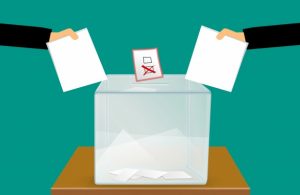Politicizing the pandemic saves lives
Democratic pressure on top Republican government officials has helped pass legislation saving more lives than without politicization.
May 3, 2020
COVID-19 has brought daily life to a halt in the United States, with widespread shelter-in-place orders, school closures and escalating shortages of medical equipment and hospital beds. As the pandemic escalates, the prognosis for the economy, the health care industry and the American people looks increasingly grim.
Accompanying this crisis is growing political backlash against the Trump administration’s response to the virus, particularly by the Democratic Party. However, just as vocal are those criticizing Democrats’ attempts to “politicize” this crisis.
For instance, President Trump said in March, “We must put politics aside, stop the partisanship and unify together as one nation and one family.” Trump loyalist Rep. Jim Jordan added that Democrats “should not play politics with the coronavirus.”
Ultimately, though, politicizing COVID-19 is critical to a healthy democracy and improving the government’s pandemic response. Throughout this crisis, the Trump administration has failed numerous times to act in the best interest of the American people, and its approach needs to be corrected.
Even before the pandemic began, Trump made missteps that likely decreased the world’s preparedness for a global outbreak. In 2018, his administration cut 80% of CDC funding to foreign countries used to train health care workers and improve emergency responses to global pandemics. In October 2019, he discontinued a program known as “Predict,” which was focused on monitoring animal-to-human diseases (such as COVID-19). These steps likely cost lives both abroad and in America. Most recently, Trump’s 2021 budget proposed cutting the CDC’s budget by 16%.
When the first U.S. case of coronavirus was confirmed, the administration spent far too long downplaying the threat, wasting valuable time that would have reduced the impact of the disease today. In fact, some of Trump’s initial remarks concerning the virus were that it “will go away” and that the response from his team was “really working out.”
That was on March 10. As of 10:32:29 a.m. today (Johns Hopkins University CSSE), the U.S. has over 1,138,690 COVID-19 cases and the number only continues to grow. In light of this, the Trump administration has suspended mortgage foreclosures, authorized cash payments to Americans and invoked the Defense Production Act to force private firms to produce necessities like ventilators during the crisis.
Additionally, despite a change in tone from the administration, its long term response is far from adequate. For example, on a conference call with governors, Trump stated, “I haven’t heard about testing being a problem.” The U.S., however, lags far behind other countries in terms of per capita testing, with numerous state leaders expressing concerns about shortages in supplies and testing kits that the federal government has failed to provide.
The coronavirus has also exposed systemic problems in our economy and society that politicians have long failed to address. For one, America’s sick leave policy lags behind that of almost every other industrialized nation in the world, forcing workers to choose between their lives and their livelihoods.
Moreover, according to a study by CareerBuilder, 78% of Americans live paycheck to paycheck, just one emergency away from dire poverty. Overloaded U.S. health care systems and the astronomical medical bills COVID-19 survivors will be left to pay off illustrate just how flawed the system is. Politicizing the virus and critically examining the government negligence that has led us to this point is key to improving the administration’s response, helping the U.S. recover and ensuring that the country will be resilient to future challenges.
Politicization has already led to short-term gains. For example, the Trump administration’s tone on COVID-19 no longer downplays it as a threat. Additionally, while many media outlets reported in a negative light that Congressional Democrats were trying to stall the coronavirus relief bill’s passage, this was by and large something to be praised, because their opposition to the bill helped generate momentum for certain provisions that would help the working class. For example, Sen. Bernie Sanders threatened to hold up the bill unless its assistance to laid-off workers was strengthened, and he was successful in his attempt. If this hadn’t taken place, it’s likely that a weekly unemployment benefit increase of $600 wouldn’t have occurred.
Some, however, oppose politicization by principle, stating that it uses real people and their suffering as political pawns. Critics also warn of potential misinformation about the Trump administration unfairly influencing public opinion. However, it is precisely the human toll of COVID-19 that justifies this politicization. Refusing to do anything to address the poor pandemic response, as well as the underlying social conditions that have made coronavirus so devastating, does a massive disservice to those who have suffered, and guarantees that many more will suffer in the future. Calling for national unity to address this crisis is simply a way for the Trump administration to mask its mismanagement and negligence, making them the ones who are truly using suffering to score political points.
Admittedly, some forms of politicization are flawed. For example, Trump seemed to imply that aid was contingent on how well governors had treated him in the past, saying, “If they don’t treat you right, I don’t call.” He approved Gov. Gavin Newsom’s request to declare the coronavirus outbreak in California a major disaster but stalled in doing the same for Michigan due to tense relations with Gov. Gretchen Whitmer. On the Democratic end, a common criticism of Trump was that he eliminated the White House’s pandemic response office, but later investigation revealed that it was folded into another office, making the issue much less clear-cut. Politicization should not be based on arbitrary factors such as patronage, and it should steer away from incorrect or questionable claims.
However, it is undoubtedly acceptable, and even necessary, to call out incompetence in the administration when there is concrete evidence for it. As the crisis and its long term effects intensify, we should be unapologetic in demanding better policy from Trump and Congress and hold them accountable during the elections this November. After all, lives are at stake.






